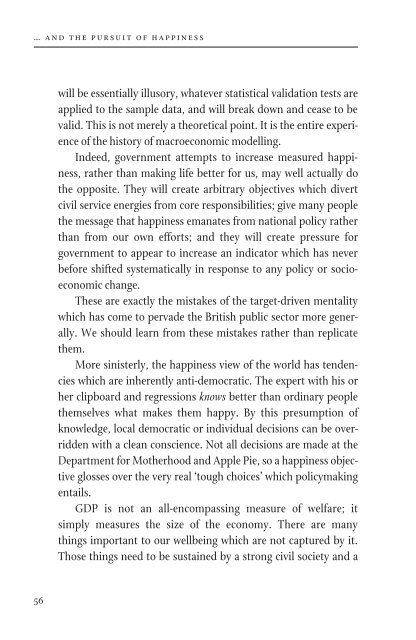… and the Pursuit of Happiness - Institute of Economic Affairs
… and the Pursuit of Happiness - Institute of Economic Affairs
… and the Pursuit of Happiness - Institute of Economic Affairs
Create successful ePaper yourself
Turn your PDF publications into a flip-book with our unique Google optimized e-Paper software.
<strong>…</strong> <strong>and</strong> <strong>the</strong> pursuit <strong>of</strong> happiness<br />
<strong>the</strong> folly <strong>of</strong> wellbeing in public policy<br />
will be essentially illusory, whatever statistical validation tests are<br />
applied to <strong>the</strong> sample data, <strong>and</strong> will break down <strong>and</strong> cease to be<br />
valid. This is not merely a <strong>the</strong>oretical point. It is <strong>the</strong> entire experience<br />
<strong>of</strong> <strong>the</strong> history <strong>of</strong> macroeconomic modelling.<br />
Indeed, government attempts to increase measured happiness,<br />
ra<strong>the</strong>r than making life better for us, may well actually do<br />
<strong>the</strong> opposite. They will create arbitrary objectives which divert<br />
civil service energies from core responsibilities; give many people<br />
<strong>the</strong> message that happiness emanates from national policy ra<strong>the</strong>r<br />
than from our own efforts; <strong>and</strong> <strong>the</strong>y will create pressure for<br />
government to appear to increase an indicator which has never<br />
before shifted systematically in response to any policy or socioeconomic<br />
change.<br />
These are exactly <strong>the</strong> mistakes <strong>of</strong> <strong>the</strong> target-driven mentality<br />
which has come to pervade <strong>the</strong> British public sector more generally.<br />
We should learn from <strong>the</strong>se mistakes ra<strong>the</strong>r than replicate<br />
<strong>the</strong>m.<br />
More sinisterly, <strong>the</strong> happiness view <strong>of</strong> <strong>the</strong> world has tendencies<br />
which are inherently anti-democratic. The expert with his or<br />
her clipboard <strong>and</strong> regressions knows better than ordinary people<br />
<strong>the</strong>mselves what makes <strong>the</strong>m happy. By this presumption <strong>of</strong><br />
knowledge, local democratic or individual decisions can be overridden<br />
with a clean conscience. Not all decisions are made at <strong>the</strong><br />
Department for Mo<strong>the</strong>rhood <strong>and</strong> Apple Pie, so a happiness objective<br />
glosses over <strong>the</strong> very real ‘tough choices’ which policymaking<br />
entails.<br />
GDP is not an all-encompassing measure <strong>of</strong> welfare; it<br />
simply measures <strong>the</strong> size <strong>of</strong> <strong>the</strong> economy. There are many<br />
things im portant to our wellbeing which are not captured by it.<br />
Those things need to be sustained by a strong civil society <strong>and</strong> a<br />
democratically accountable, well-run government. If we cannot<br />
make convincing cases for <strong>the</strong>m without ‘scientific pro<strong>of</strong>’ that<br />
<strong>the</strong>y make people happy, we are totally morally adrift. Government<br />
does not fail because it does not measure happiness; it fails<br />
when its energies are misdirected on <strong>the</strong> basis ei<strong>the</strong>r <strong>of</strong> poorquality<br />
information or <strong>of</strong> <strong>the</strong> false presumption <strong>of</strong> knowledge by<br />
would-be central planners.<br />
References<br />
Deaton, A. (2008), ‘Income, health <strong>and</strong> wellbeing around <strong>the</strong><br />
world: evidence from <strong>the</strong> Gallup world poll’, Journal <strong>of</strong><br />
<strong>Economic</strong> Perspectives, 22(2): 53–72.<br />
Griffith, T. D. (2004), ‘Progressive taxation <strong>and</strong> happiness’,<br />
Boston College Law Review, 45(5): 1363–1398.<br />
Johns, H. <strong>and</strong> P. Ormerod (2008), ‘The unhappy thing about<br />
happiness economics’, Real-World <strong>Economic</strong>s Review, 46:<br />
139–46.<br />
Kahneman, D. <strong>and</strong> A. Deaton (2010), ‘High income improves<br />
evaluation <strong>of</strong> life but not emotional well-being’, PNAS,<br />
107(38): 16489–16493<br />
Klein, L. R. (1946), ‘A post-mortem on transition predictions <strong>of</strong><br />
national product’, Journal <strong>of</strong> Political Economy, LIV: 289–307.<br />
Klein, L. R. (1947), ‘The use <strong>of</strong> econometric models as a guide to<br />
economic policy’, Econometrica, 15: 111–151.<br />
Layard, R. (2005), <strong>Happiness</strong>: Lessons from a new science,<br />
Harmondsworth: Penguin.<br />
Nordhaus, W. D. <strong>and</strong> J. Tobin (1971), ‘Is growth obsolete?’,<br />
Cowles Foundation Discussion Papers 319, Cowles<br />
Foundation for Research in <strong>Economic</strong>s, Yale University.<br />
56 57












